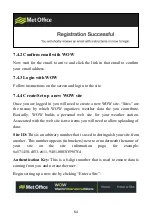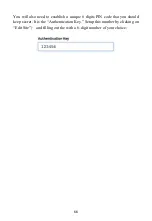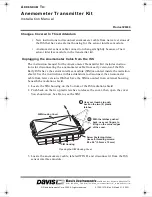
78
Problem
Solution
problems with
outdoor sensor
reception on
console
signal quality issues caused by electrical interference or
other location related factors (obstacles along line of
sight).
To troubleshoot, install a fresh set of batteries in the
remote sensor array and console. For cold weather
environments, install lithium batteries.
If problems remain with fresh batteries, ensure power
adapter is not too close to the console, and the console is
not close to other electrical noise generating devices such
as TVs, monitors, computers and transmitting devices.
If you still have intermittent problems move sensor and
console closer together, but not closer than 5 ft. Also
check that there are no metal barriers like aluminum
siding, or metal wall framing, along the line of sight
between sensor and console. Relocate sensor and console
as necessary to avoid obstacles.
Depending on natural barriers you may also have to move
the outdoor sensor higher and/or closer.
Indoor
temperature
sensor reads too
high in the day
time, and/or
night time
Make sure the thermo-hygrometer is mounted in an
indoor area where it will not be exposed to direct sunlight,
our radiative heating, or convective heating.
Indoor and
Outdoor
Temperature do
not agree
during indoor
testing
During installation testing it is useful to test with both
console and outdoor unit in the same room. Allow up to
one hour for the sensors to stabilize and adjust to room
temperature. The indoor and outdoor temperature sensors
should agree within 4 °F (the sensor accuracy is ± 2 °F).
If these values still disagree, use calibration offsets for
one or both sensors (see section 5.3.1) to adjust to a
known good reference temperature.
Indoor and
Outdoor
Humidity do
not agree
during indoor
testing
The procedure here is that same as for outdoor/indoor
temperature. The sensors should agree within 10 % (the
sensor accuracy is ± 5 %)
If these values still disagree, use calibration offsets for
one or both sensors (see section 5.3) to adjust to a known
good reference humidity.











































